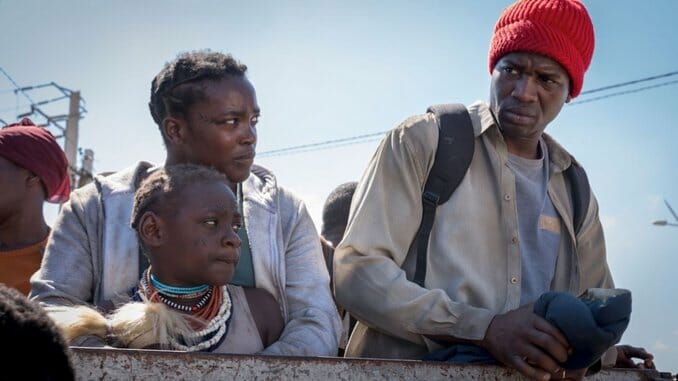
Nothing sucks the energy out of horror than movies that withhold on horror. Movies can scare audiences in a variety of ways, of course, but the very least a horror movie can be is scary instead of screwing around. Remi Weekes’ His House doesn’t screw around. The film begins with a tragedy, and within 10 minutes of that opening handily out-grudges The Grudge by leaving ghosts strewn on the floor and across the stairs where his protagonists can trip over them.
In His House, viewers follow the protagonists out of a civil war and into the haunted house, with emphasis on the “haunted.” Husband and wife Bol (Sope Dìrísù) and Rial (Wunmi Mosaku) flee the violent conflict devouring their South Sudan home, their daughter Nyagak (Malaika Wakoli-Abigaba) in tow, traversing thousands of miles of unforgiving terrain and treacherous waters. The latter demands a toll be paid for passage, and on an especially stormy crossing, Nyagak is tossed overboard by waves and drowns. Safe but heartbroken, Bol and Rial arrive in England, claim asylum, and receive assigned residence on a council estate in appalling disrepair, though their case worker, Mark (Matt Smith), opines that the apartment is bigger than his own. Maybe so. But odds are good that Mark’s pad isn’t teeming with croaking spirits, crawling through the walls and biding their time for the perfect opportunity to scare Bol’s trousers off and drive him mad with his own survivor’s guilt. (Also, there’s a witch.)
His House is timely horror humble enough not to advertise its timeliness. Weekes speaks to history, though, and not simply the present. What Bol and Rial have gone through to escape bloodshed mirrors the tribulations of countless other immigrants over the centuries, though the others probably didn’t have to deal with angry spirits after sundown. As poor Bol is tormented mercilessly each night by drowned, decaying phantoms, Rial regards her own experiences with the ghosts with a calm that appears to function as a deterrent.
Eventually, Weekes reveals the reasons for Bol’s stark fear versus Rial’s unflappable steel, which are rooted in more than just differences of character. Suffice to say the wraiths have their reasons for hounding Bol, just as Bol has his reasons for aching to blend in and become English. Rial’s waxing embrace of her Sudanese background reads like a cool reaction to Bol’s enthusiastic embrace of polo shirts and football, as if she feels compelled to represent South Sudan more so now that Bol has defected to Britain. But neither of them are at home, whether in their flat or in society. The couple are altogether unwelcome by all from the moment they start trying to acclimate to England.
As His House unfolds, audience sympathies shift back and forth from Bol to Rial as each develops their own relationship with the ghosts. Weekes’ emotional acuity is staggering, as strong a recommendation as the impressive effects design used to bring the hectoring spirits to un-life. Tactile practical effects work produces monsters so lifelike that they could reach through the screen and throttle folks watching at home, and ruthless use of shadow, light and blocking enhances these effects further: They cut such frightening and imposing figures that one can only assume Bol has brought their wrath down on himself.
Ultimately, this is a movie about the inescapable innate grief of immigrant stories, a companion piece to contemporary independent cinema like Jonas Carpignano’s Mediterranea, which captures the dangers facing immigrants on the road and at their destinations with brutal neorealist clarity. Weekes is deeply invested in Bol and Rial as people, in where they come from, what led them to leave, and most of all what they did to leave.
But Weeks is equally invested in making his viewers leap out of their skins. The relationship between the film’s human experiences and genre elements is inviolate. One cannot be told without the other. Nyagak, in one of His House’s most unnerving and riveting sequences, comes within a blade’s swish of taking Bol’s life as a mob of shuffling zombies pin him against a wall. The moment is key to the movie’s genre identity and to Weekes’ point about the burdens Bol (and all immigrants by extension) carries with him: echoes of the lost, certainly, but also the violence that impelled him and Rial to leave. His House cares deeply about both parts of that equation. It’s touching. It’s thoughtful. It’s unrelentingly scary. It’s horror.
Director: Remi Weekes
Writer: Remi Weekes
Starring: Wunmi Mosaku, Sope Dirisu, Matt Smith, Javier Botet
Release Date: October 30, 2020
Bostonian culture journalist Andy Crump covers the movies, beer, music, and being a dad for way too many outlets, perhaps even yours. He has contributed to Paste since 2013. You can follow him on Twitter and find his collected work at his personal blog. He’s composed of roughly 65% craft beer.